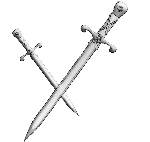

Copyright 2009-

Choosing Words to Create Worlds
Are there words that work for one story but not another, that fit a non-
The short answer is, of course.
A business report will not contain quaint, country axioms and slang. It will use
company-
In the world of fiction writing, word choice can also be critical.
Will your character say ain't gonna and homeboy or will he say I will not do that
and companion? Perhaps his words will tend toward the average—I'm not going to and
friend. And each character might have his own speech style, though terms used would
be similar for those in a close-
Why is word choice important?
A work of fiction invites us into a make-
The more our words reflect the genre and setting and time period, the stronger will be the connect for the reader.
Don't shock your reader out of your story with the wrong words. Okay in pre-
On the other hand, words that fit your story—the characters or locale or time period or genre—will pull the reader deeper into your tale.
When your farmer uses comparisons, does he use the same words a sailor might? He shouldn't. Perhaps he describes another man with a head the shape of a cabbage and just as dense. The same farmer might compare his neighbor's ability to get out of a mess to an elusive piglet.
What colors does the farmer know that the sailor has never seen? What textures and odors?
How about the private eye who lives in Las Vegas? Would he use the same terms as the street kid in 1810 London?
The urchin might know every slang phrase for policeman. He might know everything
about his neighborhood and nothing about politics or history or even the gentry.
He might be ignorant of horses, so he couldn't use references to their size or speed
or endurance. But he could compare a friend to a sneaky, fleet-
What verbs would best reflect a character? Would your shop-
Or, take as an example a description of darkness using the color black. (And please excuse the clichés.) Would your character say—or would those in your time period understand—black as coal, black as pitch, blacker than a cave, black as a dragon's innards, or dark as the lip of a black hole?
Choosing the right words makes all the difference between a competent story and a work of literature that has depth and layers. Weave the strands of the story by your word choices. The tighter and more entwined you make them, the harder they are to unravel. And none of us want our tales to unravel.
_______________________
How do we make our words story specific?
Ask yourself some questions. Take a few minutes to consider time period. What products are available? What is the political focus of the era? What foods are common? How do the people travel, communicate, educate their children?
Is your time period accurately portrayed? Imagine household items your characters use. Straight razor or safety razor or electric razor? Determine how long travel would take for the period and available transportation. Do your words reflect this era? Do your characters think as a man or woman of the year 2007 or 1940 or 1653 or 2499 might?
Look at setting and locale. What is the weather like? Is this city or country or small town or inside an apartment? Do you convey more than description with your words? Do you give a sense of claustrophobia or open spaces or clutter? Do your city streets echo with car horns and jackhammers and the bells of ice cream trucks or do your characters (and thus your readers) hear nothing as they walk Lexington Avenue?
What is the educational level of each major character? Do speech and word choices reflect their differences? Their similarities?
What about genre? Does your romantic hero talk like a hard-
Have you written for the specific and particular rather than the general? Would your words fit any story or are they peculiar to one tale?
Story-
© 2007 E. A. Hill

